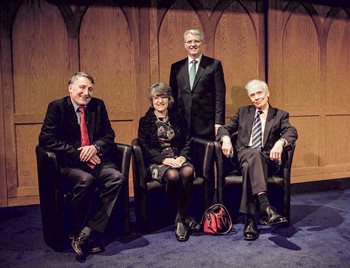Organised jointly by the Church's Union Theological College and Council for Church in Society, the College's principal, Professor Stafford Carson said, "As a Church we are very much a part of society and very conscious of the need to engage fully around issues of public concern and debate.
 "This is our third Church in the Public Square conference and like the others, I hope today makes a positive contribution to this particularly sensitive area of public debate. End of life issues raise significant theological, ethical, legal and pastoral issues for all of us, especially legislators, those in the legal, medical and caring professions, and of course, for those individuals who are directly affected."
"This is our third Church in the Public Square conference and like the others, I hope today makes a positive contribution to this particularly sensitive area of public debate. End of life issues raise significant theological, ethical, legal and pastoral issues for all of us, especially legislators, those in the legal, medical and caring professions, and of course, for those individuals who are directly affected."
Over 150 delegates from the church, legal and medical backgrounds attended the conference at Assembly Buildings in Belfast and were addressed by Baroness Finlay, chairwoman of the All-Party Parliamentary Group on Dying Well and President of the British Medical Association, Robert Preston, Director of the London-based think-tank, Living and Dying Well and Professor John Wyatt, professor of Ethics and Perinatology at University College.
Thanking the Church for organising the conference and facilitating the debate, Baroness Finlay said, "I welcome the opportunity to discuss this important subject in Belfast as its implications are far-reaching.
"There is an important distinction between withdrawing treatment when death is inevitable versus foreshortening life. With this in mind, there is considerable opposition amongst doctors to being involved in the assessment of eligibility for and the administration of physician-assisted suicide.
"Doctors are well aware of the difficulty of predicting the course of an individual's disease with any great accuracy and know how difficult it is to assess mental capacity for such a major decision as foreshortening life. Doctors are also aware of the subtle coercive forces on patients and how difficult they are to detect.
"All of these are important areas for discussion and consideration, not least how individual patients make difficult decisions and what dignity means to them and what can be done to enhance a person's sense of dignity."
Giving an overview of the assisted dying debate Robert Preston said, "The question of whether what is being called 'assisted dying' should be legalised is a complex one and this conference is a welcome opportunity to discuss the issues and provide some informed clarity around them.
"One key question for consideration is this, would we seriously consider licensing other criminal acts for certain groups of people and in specified circumstances? We also need to examine if there is evidence to suggest that the law, as it stands, is oppressive or otherwise not fit for purpose and would the legislation being proposed in Westminster and Edinburgh be preferable to the status quo?
"When this issue is examined in the round and with due regard for the evidence, I believe that it is difficult to sustain a case for changing the law."
Addressing the pastoral and medical challenges from a Christian perspective, Professor John Wyatt said, "A frequent argument used is that assistance of suicide can be an expression of compassion and this has been recently supported by several prominent Christian leaders. In my view authentic compassion leads not to the assistance of self-destruction but to focus on better methods of pain relief and symptom control at the end of life.
"Our secular age has placed renewed emphasis on individual rights, and assisted suicide fits squarely with modern preoccupations about autonomy, the individual's right to self-mastery and self-governance."
"If the State gives us the right to control every other aspect of our life, why should we not have to right to control the time and the manner of our own deaths? I suggest that this robust individualism needs to be balanced by a recognition of our mutual dependence and inter-relatedness. Respect for human life is part of the glue that binds our society together."
Max Watson, Medical Director of the Northern Ireland Hospice and Moyna Bill, Consultant Anaesthetist at Belfast's Royal Victoria Hospital, introduced the speakers. Delegates also had the opportunity to engage in roundtable discussions after each presentation.
Photo: Speakers at today's Church in the Public Square conference 'Living and Dying Well' (left to right) Professor John Wyatt, Baroness Finlay, Robert Preston and standing, Professor Stafford Carson.